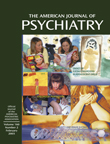To the Editor: Dr. Links and colleagues report on a study of the correlation of the Affective Lability Scale with a single-item visual analogue scale of affective experience. They note that in their group of 21 outpatients, scores on this single item did not correlate with scores on the scale in a manner that they consider consistent with the validity of the Affective Lability Scale. We appreciate their interest in our scale and share their interest in validation of the Affective Lability Scale in a range of suitable populations. Unfortunately, their study is methodologically weak in at least three areas and yields results that are not germane to our study. There are several major limitations to the study, as well as a number of more minor ones.
First, the Affective Lability Scale was designed to study populations with unstable affect. There are no data presented regarding the diagnoses of the small group of subjects reported on and no indication that they come from populations theoretically manifesting affective lability. Our study had 152 patients who were carefully diagnosed with a procedure that included two separate structured diagnostic interviews (the Structured Interview for the Diagnosis of Personality Disorders and the Schedule for Affective Disorders and Schizophrenia) of high reliability. Thus, we compared groups of patients with clear DSM-IV diagnoses of conditions with putative unstable affect (borderline personality disorder) to patients with other personality disorder diagnoses in which stable affect is expected. Thus, the patients of Dr. Link and colleagues are not demonstrated to be in any way similar to ours, and the lack of detail regarding their diagnoses, regardless of reliability, renders their comparison with our study group problematic.
Second, the authors used a single item to measure affective experience. They present no data to suggest that this item has suitable test-retest reliability in their group. Both the Affective Lability Scale and the Affect Intensity Measure, the two scales used in our study, have well-documented test-retest reliability (0.84 for the global Affective Lability Scale and 0.81 for the Affect Intensity Measure). With no evidence of test-retest reliability, the most parsimonious explanation of variance over time in scores in patients with stable symptoms is error variance. Error variance due to test-retest unreliability, by definition, cannot correlate with systematic variance associated with reliable scores. Thus, the lack of correlation between an index of error variance (affective lability) and reliable scores on the Affective Lability Scale is completely expected and cannot address the issue of the scale’s validity.
Third, there are multiple dimensions of affect, including intensity, instability, and polarity. Our study examined correlations between intensity and instability across polarity of affective experience. Dr. Links and colleagues ignore this well-replicated factor structure and present a single index of affective experience collapsing across three known orthogonal dimensions. They provide no data regarding the convergent and discriminant validity of their index, giving no idea as to what the other correlates of this single-item scale would be. Thus, we have no idea what their scale is measuring.
In conclusion, Dr. Links and colleagues, who suggest that their data call into question the validity of the Affective Lability Scale, overinterpret their data. We stand by our results and welcome more methodologically relevant tests of the Affective Lability Scale and other measures of affective instability.

